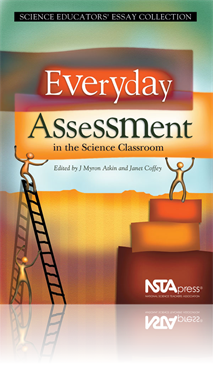All Book Chapters
Book Chapter
Cooperative Learning and Assessment
Cooperative learning in its simplest sense is two or more students working together on an assignment. In an expanded definition, cooperative learning becomes an opportunity for students to interact with one another intellectually and socially under ...
Book Chapter
Writing, as we all know, is an integral part of any discipline. And, because of the important role that writing up lab reports and research plays in the field of science, you must help your students work on writing throughout the year. This chapter...
Book Chapter
Adapting Labs and Troubleshooting
A great deal of information is available on how children learn—brain research, multiple intelligence aspects, concrete versus abstract thinking, environmental stimuli, and so on—but one key feature can be gleaned from all of the studies, and that...
Book Chapter
One common misconception in the middle school science classroom is that students magically will know how to do many of the seemingly easy tasks teachers assign. In reality, even the simple direction of using written resources to gain background info...
Book Chapter
One of the most challenging activities in the middle school science lab is taking measurements. A simple ruler can send students into a questioning mob around a teacher, not unlike a shark-feeding frenzy. Student activities that require using and r...
Book Chapter
This section includes resources that any new teacher would want to have at their fingertips. It offers reproducible lists, quizzes, and forms. These resources will assist in making the first year of teaching a smooth and successful one....
Book Chapter
This section offers practical resources that will be quite valuable during those first few months of teaching middle school science. Here you will find recipes that include salt crystals, culture medium, fun putty, and the ever-popular "oobleck". T...
Book Chapter
The Importance of Everyday Assessment
Assessment for learning is set in the context of conflicts and synergies with the other purposes of assessments. The core ideas are that it is characterized by the day-to-day use of evidence to guide students’ learning and that everyday practice mu...
Book Chapter
As a context for thinking about the claims made in this book, some of the circumstances that have influenced the demand for and character of assessment in general are noted. The argument is then made that the substantial lack of coherence in today’...
Book Chapter
Learning Through Assessment: Assessment for Learning in the Science Classroom
This chapter presents an extended example from a middle school science classroom of what assessment that supports learning looks like. In the example, the teacher models assessment for learning by talking about learning with her students; showing sam...
Book Chapter
Examining student work is an essential aspect of teaching, yet it is easy to miss opportunities to learn about how students are interpreting—or misinterpreting—the lessons we present to them. In this chapter the author shares insights concerning ...
Book Chapter
This chapter provides an overview of frameworks that teachers can use to conduct assessments of students’ engagement in scientific inquiry. The author examines two factors that are central to such assessment. One factor is the design of classroom l...
Book Chapter
Using Questioning to Assess and Foster Student Thinking
Questioning can be used to probe for understanding, to initiate inquiry, and to promote development of understanding. The results from questioning, listening, and assessment also can be used by teachers to promote their own growth as professionals. T...
Book Chapter
Involving Students in Assessment
While much of the responsibility for classroom assessment lies with teachers, students also play an important role in meaningful assessment activity. Bringing students into the assessment process is a critical dimension of facilitating student learni...
Book Chapter
Reporting Progress to Parents and Others: Beyond Grades
As science education moves increasingly in the direction of teaching to standards, teachers call for classroom assessment techniques that provide a richer source of “rigorous and wise diagnostic information.” Student-to-student comparisons and si...




